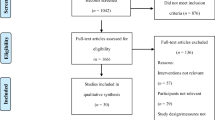Abstract
Mindfulness-based treatments for health issues and psychological disorders have increased in popularity and use. A large amount of empirical evidence indicates that these treatments are effective. However, it is possible that these scientific investigations of mindfulness-based treatments have not been conducted with representative samples. In particular, it seems like most participants in these studies are female. In order to explore this, we conducted a systematic review and examined the sample demographics of 117 articles that investigated the effectiveness of mindfulness-based stress reduction or mindfulness-based cognitive therapy via randomized controlled trials. Male participants accounted for less than 29% of the 9820 total participants. These findings suggest that the evidence supporting the effectiveness of mindfulness-based treatments is based on non-representative samples, and future research should work to correct this.
Similar content being viewed by others
References
Addis, M. E., & Mahalik, J. R. (2003). Men, masculinity, and the contexts of help seeking. American Psychologist, 58(1), 5–14. doi:10.1037/0003-066X.58.1.5.
APA (2005). Report of the 2005 Presidential Task Force on evidence-based practice.
Azorin, J. M., Bellivier, F., Kaladjian, A., Adida, M., Belzeaux, R., Fakra, E., et al. (2013). Characteristics and profiles of bipolar I patients according to age-at-onset: findings from an admixture analysis. Journal of Affective Disorders, 150(3), 993–1000. doi:10.1016/j.jad.2013.05.026.
Brown, K. W., Creswell, J. D., & Ryan, R. M. (2015). Handbook of mindfulness: theory, research and practice. New York: Guilford.
Chiesa, A., & Serretti, A. (2011). Mindfulness based cognitive therapy for psychiatric disorders: a systematic review and meta-analysis. Psychiatry Research, 187(3), 441–453. doi:10.1016/j.psychres.2010.08.011.
Cuijpers, P., van Straten, A., & Smit, F. (2006). Psychological treatment of late-life depression: a meta-analysis of randomized controlled trials. International Journal of Geriatric Psychiatry, 21(12), 1139–1149. doi:10.1002/gps.1620.
Davidson, R. J., & Kaszniak, A. W. (2015). Conceptual and methodological issues in research on mindfulness and meditation. American Psychologist, 70(7), 581–592. doi:10.1037/a0039512.
Donker, T., Batterham, P. J., Warmerdam, L., Bennett, K., Bennett, A., Cuijpers, P., et al. (2013). Predictors and moderators of response to internet-delivered interpersonal psychotherapy and cognitive behavior therapy for depression. Journal of Affective Disorders, 151(1), 343–351. doi:10.1016/j.jad.2013.06.020.
Eaton, N. R., Krueger, R. F., Markon, K. E., Keyes, K. M., Skodol, A. E., Wall, M., et al. (2013). The structure and predictive validity of the internalizing disorders. Journal of Abnormal Psychology, 122(1), 86–92. doi:10.1037/a0029598.
Essau, C. A., Lewinsohn, P. M., Seeley, J. R., & Sasagawa, S. (2010). Gender differences in the developmental course of depression. Journal of Affective Disorders, 127(1–3), 185–190. doi:10.1016/j.jad.2010.05.016.
Frank, E., Soreca, I., Swartz, H. A., Fagiolini, A. M., Mallinger, A. G., Thase, M. E., et al. (2008). The role of interpersonal and social rhythm therapy in improving occupational functioning in patients with bipolar I disorder. American Journal of Psychiatry, 165(12), 1559–1565. doi:10.1176/appi.ajp.2008.07121953.
Geiger, P. J., Boggero, I. A., Brake, C. A., Caldera, C. A., Combs, H. L., Peters, J. R., et al. (2016). Mindfulness-based interventions for older adults: a review of the effects on physical and emotional well-being. Mindfulness, 7(2), 296–307. doi:10.1007/s12671-015-0444-1.
Gouwy, A., Christianens, W., & Bracke, P. (2008). Mental health services use in the general Belgian population: estimating the impact of mental health and social determinants. Arhcives of Public Health, 66, 50–68.
Grossman, P., Niemann, L., Schmidt, S., & Walach, H. (2004). Mindfulness-based stress reduction and health benefits. A meta-analysis. Journal of Psychosomatic Research, 57(1), 35–43. doi:10.1016/S0022-3999(03)00573-7.
Gu, J., Strauss, C., Bond, R., & Cavanagh, K. (2015). How do mindfulness-based cognitive therapy and mindfulness based stress reduction improve mental health and wellbeing? A systematic review and meta-analysis of mediation studies. Clinical Psychology Review, 37, 1–12. doi:10.1016/j.cpr.2015.01.006.
Hayes, S. C., Strosahl, K. D., & Wilson, K. G. (1999). Acceptance and commitment therapy: an experiential approach to behavior change. New York: Guilford.
Hohmann, A. A., & Parron, D. L. (1996). How the new NIH guidelines on inclusions of women and minorities apply: efficacy trials, effectiveness trials, and validity. Journal of Consulting and Clinical Psychology, 64(5), 851–855. doi:10.1037/0022-006X.64.5.851.
Houle, J., Villaggi, B., Beaulieu, M. D., Lesperance, F., Rondeau, G., & Lambert, J. (2013). Treatment preferences in patients with first episode depression. Journal of Affective Disorders, 147(1–3), 94–100. doi:10.1016/j.jad.2012.10.016.
Johnson, D. P., & Whisman, M. A. (2013). Gender differences in rumination: a meta-analysis. Personality and Individual Differences, 55(4), 367–374. doi:10.1016/j.paid.2013.03.019.
Kabat-Zinn, J. (1991). Full catastrophe living: using the wisdom of your body and mind to face stress, pain, and illness. New York: Delta Trade Paperbacks.
Katz, D., & Toner, B. (2013). A systematic review of gender differences in the effectiveness of mindfulness-based treatments for substance use disorders. Mindfulness, 4, 318–331. doi:10.1007/s12671-012-0132-3.
Kawakami, N., Abdulghani, E. A., Alonso, J., Bromet, E. J., Bruffaerts, R., Caldas-de-Almeida, J. M., et al. (2012). Early-life mental disorders and adult household income in the World Mental Health Surveys. Biological Psychiatry, 72(3), 228–237. doi:10.1016/j.biopsych.2012.03.009.
Kazdin, A. E. (2008). Evidence-based treatment and practice: new opportunities to bridge clinical research and practice, enhance the knowledge base, and improve patient care. American Psychologist, 63(3), 146–159. doi:10.1037/0003-066X.63.3.146.
Kessler, R. (2006). Epidemiology of depression among women. In C. Keyes & S. Goodman (Eds.), Women and depression: a handbook for the social, behavioral and biomedical science (pp. 22–37). New York: Cambridge University Press.
Kessler, R. C., Berglund, P., Demler, O., Jin, R., Merikangas, K. R., & Walters, E. E. (2005). Lifetime prevalence and age-of-onset distributions of DSM-IV disorders in the National Comorbidity Survey Replication. Archives of General Psychiatry, 62(6), 593–602. doi:10.1001/archpsyc.62.6.593.
Lilienfeld, S. O., Ritschel, L. A., Lynn, S. J., Cautin, R. L., & Latzman, R. D. (2013). Why many clinical psychologists are resistant to evidence-based practice: root causes and constructive remedies. Clinical Psychology Review, 33(7), 883–900. doi:10.1016/j.cpr.2012.09.008.
Linehan, M. M. (1993). Cognitive-behavioral treatment of borderline personality disorder. New York: Guilford.
Luders, E., Thompson, P. M., & Kurth, F. (2015). Larger hippocampal dimensions in meditation practitioners: differential effects in women and men. Frontiers in Psychology, 6, 186. doi:10.3389/psyg.2015.00186.
Mak, W. W., Law, R. W., Alvidrez, J., & Perez-Stable, E. J. (2007). Gender and ethnic diversity in NIMH-funded clinical trials: review of a decade of published research. Administration and Policy in Mental Health, 34(6), 497–503. doi:10.1007/s10488-007-0133-z.
Martinez-Hernaez, A., Carceller-Maicas, N., DiGiacomo, S. M., & Ariste, S. (2016). Social support and gender differences in coping with depression among emerging adults: a mixed-methods study. Child and Adolescent Psychiatry Mental Health, 10, 2. doi:10.1186/s13034-015-0088-x.
Merkes, M. (2010). Mindfulness-based stress reduction for people with chronic diseases. Austrialia Journal of Primary Health, 16(3), 200–210. doi:10.1071/PY09063.
Nolen-Hoeksema, S. (1991). Responses to depression and their effects on the duration of depressive episodes. Journal of Abnormal Psychology, 100, 569–582. doi:10.1037/0021-843X.100.4.569.
Ormel, J., Petukhova, M., Chatterji, S., Aguilar-Gaxiola, S., Alonso, J., Angermeyer, M. C., et al. (2008). Disability and treatment of specific mental and physical disorders across the world. British Journal of Psychiatry, 192(5), 368–375. doi:10.1192/bjp.bp.107.039107.
Pagoto, S. L., Schneider, K. L., Oleski, J. L., Luciani, J. M., Bodenlos, J. S., & Whited, M. C. (2012). Male inclusion in randomized controlled trials of lifestyle weight loss interventions. Obesity (Silver Spring), 20(6), 1234–1239. doi:10.1038/oby.2011.140.
Pattyn, E., Verhaeghe, M., & Bracke, P. (2015). The gender gap in mental health service use. Social Psychiatry and Psychiatric Epidemiology, 50(7), 1089–1095. doi:10.1007/s00127-015-1038-x.
Price, E. C., Fiske, A., & Edelstein, B. (2015). Efficacy of psychosocial interventions in men over 55: a critical review. Geropsychology, 28(2), 87–96. doi:10.1024/1662-9647/a000125.
Rosenfield, S., & Mouzon, D. M. (2013). Gender and mental health. In C. S. Aneshensel, J. C. Phelan, & A. Bierman (Eds.), Handbook of sociology of mental health (pp. 277–296). New York: Springer.
Saarni, S. I., Viertio, S., Perala, J., Koskinen, S., Lonnqvist, J., & Suvisaari, J. (2010). Quality of life of people with schizophrenia, bipolar disorder and other psychotic disorders. British Journal of Psychiatry, 197(5), 386–394. doi:10.1192/bjp.bp.109.076489.
Sanna, L., Stuart, A. L., Pasco, J. A., Kotowicz, M. A., Berk, M., Girardi, P., et al. (2013). Physical comorbidities in men with mood and anxiety disorders: a population-based study. BMC Medicine, 11, 110. doi:10.1186/1741-7015-11-110.
Shapiro, S., Carlson, L., Astin, J., & Freedman, B. (2006). Mechanisms of mindfulness. Journal of Clinical Psychology, 62(3), 373–386. doi:10.1002/jclp.20237.
Spek, V., Nyklicek, I., Cuijpers, P., & Pop, V. (2008). Predictors of outcome of group and internet-based cognitive behavior therapy. Journal of Affective Disorders, 105(1–3), 137–145. doi:10.1016/j.jad.2007.05.001.
Swift, J. K., Callahan, J. L., Ivanovic, M., & Kominiak, N. (2013). Further examination of the psychotherapy preference effect: a meta-regression analysis. Journal of Psychotherapy Integration, 23(2), 134–145. doi:10.1037/a0021175.
Teasdale, J. D., Segal, Z. V., Williams, J. M., Ridgeway, V. A., Soulsby, J. M., & Lau, M. A. (2000). Prevention of relapse/recurrence in major depression by mindfulness-based cognitive therapy. Journal of Consulting and Clinical Psychology, 68(4), 615–623. doi:10.1037/0022-006X.68.4.615.
Tekin, A., Karadag, H., Suleymanoglu, M., Tekin, M., Kayran, Y., Alpak, G., et al. (2016). Prevalence and gender differences in symptomatology of posttraumatic stress disorder and depression among Iraqi Yazidis displaced into Turkey. European Journal of Psychotraumatolgy, 7, 28556. doi:10.3402/ejpt.v7.28556.
Wang, R., Lagakos, S. W., Ware, J. H., Hunter, D. J., & Drazen, J. M. (2007). Statistics in medicine: reporting of subgroup analyses in clinical trials. New England Journal of Medicine, 357(21), 2189–2194. doi:10.1056/NEJMsr077003.
Whiteford, H. A., Degenhardt, L., Rehm, J., Baxter, A. J., Ferrari, A. J., Erskine, H. E., et al. (2013). Global burden of disease attributable to mental and substance use disorders: findings from the Global Burden of Disease Study 2010. Lancet, 382(9904), 1575–1586. doi:10.1016/S0140-6736(13)61611-6.
Xu, Y., Schneier, F., Heimberg, R. G., Princisvalle, K., Liebowitz, M. R., Wang, S., et al. (2012). Gender differences in social anxiety disorder: results from the national epidemiologic sample on alcohol and related conditions. Journal of Anxiety Disorders, 26(1), 12–19. doi:10.1016/j.janxdis.2011.08.006.
Zauszniewski, J. A., Bekhet, A. K., & Suresky, M. J. (2015). Indicators of resilience in family members of adults with serious mental illness. Psychiatry Clinician North America, 38(1), 131–146. doi:10.1016/j.psc.2014.11.009.
Acknowledgements
The authors would like to thank Olivia Hanno and Kathryn Lyle for their help with this project.
Author information
Authors and Affiliations
Corresponding author
Ethics declarations
Conflict of Interest
The authors declare that they have no conflicts of interest.
Funding
There was no funding for this study.
Ethical Approval
This article does not contain any studies with human participants or animals performed by any of the authors.
Informed Consent
This article does not include participants recruited by the authors and is a review of the existing literature; therefore, informed consent was not obtained by the authors.
Rights and permissions
About this article
Cite this article
Bodenlos, J.S., Strang, K., Gray-Bauer, R. et al. Male Representation in Randomized Clinical Trials of Mindfulness-Based Therapies. Mindfulness 8, 259–265 (2017). https://doi.org/10.1007/s12671-016-0646-1
Published:
Issue Date:
DOI: https://doi.org/10.1007/s12671-016-0646-1




